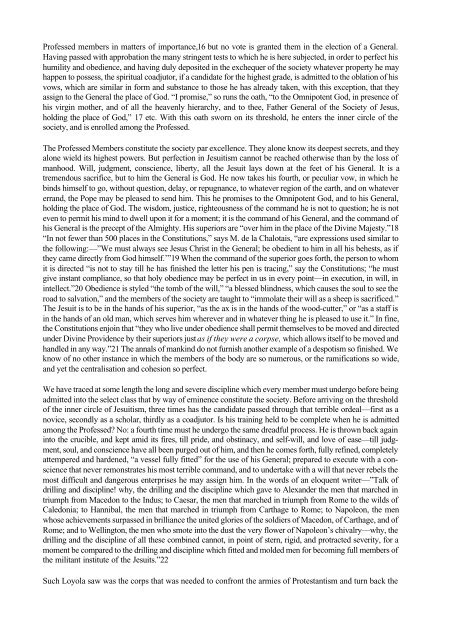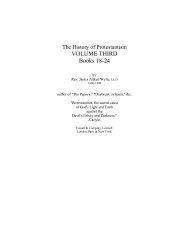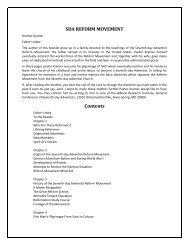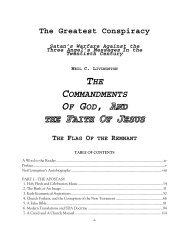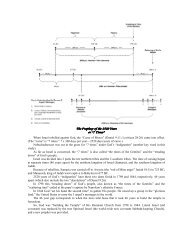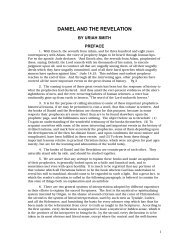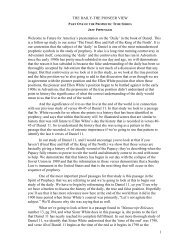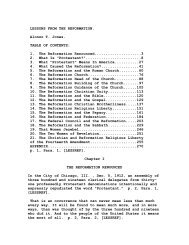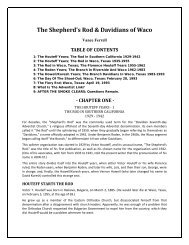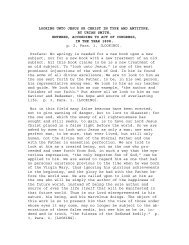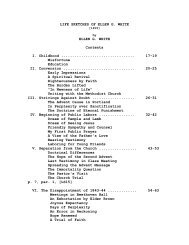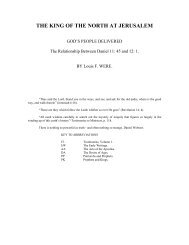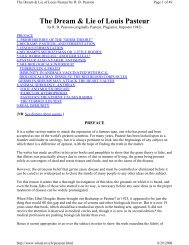History of Jesuits
History of Jesuits
History of Jesuits
Create successful ePaper yourself
Turn your PDF publications into a flip-book with our unique Google optimized e-Paper software.
Pr<strong>of</strong>essed members in matters <strong>of</strong> importance,16 but no vote is granted them in the election <strong>of</strong> a General.<br />
Having passed with approbation the many stringent tests to which he is here subjected, in order to perfect his<br />
humility and obedience, and having duly deposited in the exchequer <strong>of</strong> the society whatever property he may<br />
happen to possess, the spiritual coadjutor, if a candidate for the highest grade, is admitted to the oblation <strong>of</strong> his<br />
vows, which are similar in form and substance to those he has already taken, with this exception, that they<br />
assign to the General the place <strong>of</strong> God. “I promise,” so runs the oath, “to the Omnipotent God, in presence <strong>of</strong><br />
his virgin mother, and <strong>of</strong> all the heavenly hierarchy, and to thee, Father General <strong>of</strong> the Society <strong>of</strong> Jesus,<br />
holding the place <strong>of</strong> God,” 17 etc. With this oath sworn on its threshold, he enters the inner circle <strong>of</strong> the<br />
society, and is enrolled among the Pr<strong>of</strong>essed.<br />
The Pr<strong>of</strong>essed Members constitute the society par excellence. They alone know its deepest secrets, and they<br />
alone wield its highest powers. But perfection in Jesuitism cannot be reached otherwise than by the loss <strong>of</strong><br />
manhood. Will, judgment, conscience, liberty, all the Jesuit lays down at the feet <strong>of</strong> his General. It is a<br />
tremendous sacrifice, but to him the General is God. He now takes his fourth, or peculiar vow, in which he<br />
binds himself to go, without question, delay, or repugnance, to whatever region <strong>of</strong> the earth, and on whatever<br />
errand, the Pope may be pleased to send him. This he promises to the Omnipotent God, and to his General,<br />
holding the place <strong>of</strong> God. The wisdom, justice, righteousness <strong>of</strong> the command he is not to question; he is not<br />
even to permit his mind to dwell upon it for a moment; it is the command <strong>of</strong> his General, and the command <strong>of</strong><br />
his General is the precept <strong>of</strong> the Almighty. His superiors are “over him in the place <strong>of</strong> the Divine Majesty.”18<br />
“In not fewer than 500 places in the Constitutions,” says M. de la Chalotais, “are expressions used similar to<br />
the following:—”We must always see Jesus Christ in the General; be obedient to him in all his behests, as if<br />
they came directly from God himself.’”19 When the command <strong>of</strong> the superior goes forth, the person to whom<br />
it is directed “is not to stay till he has finished the letter his pen is tracing,” say the Constitutions; “he must<br />
give instant compliance, so that holy obedience may be perfect in us in every point—in execution, in will, in<br />
intellect.”20 Obedience is styled “the tomb <strong>of</strong> the will,” “a blessed blindness, which causes the soul to see the<br />
road to salvation,” and the members <strong>of</strong> the society are taught to “immolate their will as a sheep is sacrificed.”<br />
The Jesuit is to be in the hands <strong>of</strong> his superior, “as the ax is in the hands <strong>of</strong> the wood-cutter,” or “as a staff is<br />
in the hands <strong>of</strong> an old man, which serves him wherever and in whatever thing he is pleased to use it.” In fine,<br />
the Constitutions enjoin that “they who live under obedience shall permit themselves to be moved and directed<br />
under Divine Providence by their superiors just as if they were a corpse, which allows itself to be moved and<br />
handled in any way.”21 The annals <strong>of</strong> mankind do not furnish another example <strong>of</strong> a despotism so finished. We<br />
know <strong>of</strong> no other instance in which the members <strong>of</strong> the body are so numerous, or the ramifications so wide,<br />
and yet the centralisation and cohesion so perfect.<br />
We have traced at some length the long and severe discipline which every member must undergo before being<br />
admitted into the select class that by way <strong>of</strong> eminence constitute the society. Before arriving on the threshold<br />
<strong>of</strong> the inner circle <strong>of</strong> Jesuitism, three times has the candidate passed through that terrible ordeal—first as a<br />
novice, secondly as a scholar, thirdly as a coadjutor. Is his training held to be complete when he is admitted<br />
among the Pr<strong>of</strong>essed? No: a fourth time must he undergo the same dreadful process. He is thrown back again<br />
into the crucible, and kept amid its fires, till pride, and obstinacy, and self-will, and love <strong>of</strong> ease—till judgment,<br />
soul, and conscience have all been purged out <strong>of</strong> him, and then he comes forth, fully refined, completely<br />
attempered and hardened, “a vessel fully fitted” for the use <strong>of</strong> his General; prepared to execute with a conscience<br />
that never remonstrates his most terrible command, and to undertake with a will that never rebels the<br />
most difficult and dangerous enterprises he may assign him. In the words <strong>of</strong> an eloquent writer—”Talk <strong>of</strong><br />
drilling and discipline! why, the drilling and the discipline which gave to Alexander the men that marched in<br />
triumph from Macedon to the Indus; to Caesar, the men that marched in triumph from Rome to the wilds <strong>of</strong><br />
Caledonia; to Hannibal, the men that marched in triumph from Carthage to Rome; to Napoleon, the men<br />
whose achievements surpassed in brilliance the united glories <strong>of</strong> the soldiers <strong>of</strong> Macedon, <strong>of</strong> Carthage, and <strong>of</strong><br />
Rome; and to Wellington, the men who smote into the dust the very flower <strong>of</strong> Napoleon’s chivalry—why, the<br />
drilling and the discipline <strong>of</strong> all these combined cannot, in point <strong>of</strong> stern, rigid, and protracted severity, for a<br />
moment be compared to the drilling and discipline which fitted and molded men for becoming full members <strong>of</strong><br />
the militant institute <strong>of</strong> the <strong>Jesuits</strong>.”22<br />
Such Loyola saw was the corps that was needed to confront the armies <strong>of</strong> Protestantism and turn back the


